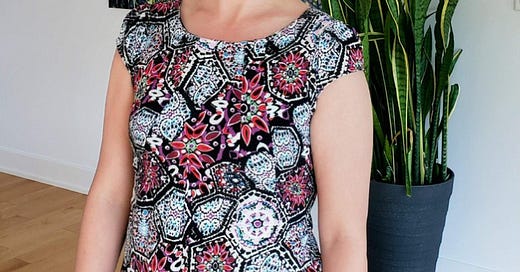I want a society that doesn’t just pay lip service to the idea of neurodiversity
Julie M Green's teenage child is autistic. She is too. Here, Julie writes about how it has been for them navigating diagnoses, school and people's judgements.
Carson has identified as non-binary from age 13, so the pronouns shift from he/him to they/them in the essay.
I think most parents intuitively know when something is off or different about their child. For a long time, I kept ignoring the little voice inside my head. Instead, I chose to blame any difference on my own shortcomings as a new mum.
I was incredibly insecure and critical of my parenting. I was always secretly keeping score and watching friends’ children. My child was slow to reach certain milestones but not remarkably so.
As a baby, Carson was colicky and difficult to settle. That baby grew into an intense toddler who had frequent tantrums (meltdowns). But he was also funny and exceptionally bright, and hyperlexic with a photographic memory.
We lived in Toronto when he was little, and he could navigate us anywhere in the city.
From the earliest age, he had an obsessive interest in language and taught himself the alphabet in different languages courtesy of YouTube.
Instead of stuffed animals, he slept with old handsets and remote controls—something we dismissed as quirky.
It wasn’t long after he started attending preschool (nursery) a couple days a week that the teachers pulled me aside and recommended autism screening. The signs were so obviously there. He was three at the time.
Thirteen years ago the perception of autism wasn’t nearly as affirming as it is now
Getting a formal diagnosis came as a watershed moment. In a way it spelled relief. Finally, there was a name for what was happening with my child. Naming their difference made it concrete, knowable.
Diagnosis took the shame out of my parenting and made me feel less alone. There were other children, other parents in this boat. Until that point, I thought the problem rested squarely with me—my innate inability to be a good mother.
Until then, I had internalised so much blame and guilt.
Thirteen years ago, the perception of autism wasn’t nearly as affirming as it is now. And even though it was a steep learning curve, I felt strangely empowered.
Knowing my child was autistic allowed me to dive headlong into research; it gave me a clear framework with which to understand and help him.
As a child, I had a lot of sensory issues
When my son was diagnosed, I knew nothing whatsoever about autism beyond Dustin Hoffman’s stereotypical portrayal in Rain Man. And I certainly knew nothing about autism in girls and women.
Through my advocacy in the community I became acquainted with a woman on the spectrum whose similarities were uncanny. That was the first time I seriously entertained the idea that I might also be autistic.
As a child, I had a lot of sensory issues with clothing, light and noise, and frequently experienced overwhelm and migraine attacks. I couldn’t handle crowds and often missed out on parties and family gatherings.
At school, I was painfully shy and prone to mutism, especially in group settings. I always had one good friend whose lead would follow and copy.
Although I was gifted, I was often made to feel stupid because I couldn’t understand what people meant, and was ridiculed and othered.
And that continued into adulthood where, despite learning to mask, I struggled to make friends and to hold down a full time job because I was forever becoming overwhelmed and falling ill.
I deliberated for a couple of years (not wanting to pay thousands of dollars for a private assessment). Eventually I approached my family practitioner, knowing that if I didn’t go through with it, the curiosity and imposter syndrome would never leave me alone.
A year later, at the height of the pandemic, I was assessed and formally identified. So, in many ways, my diagnosis was 10 years in the making.
My teen still struggles with regulation and self-esteem
School has been a nightmare for Carson, to be honest, the biggest barrier.
For thirteen years we have cycled through different placements—from public and private to special education and homeschooling. Carson is now 16 and attending high school on a part-time basis.
Last year they quit school for several weeks due to burnout, and we grappled with a new diagnosis: PDA. We are currently considering alternative options like self-directed learning.
We are still floundering and trying to find that elusive right learning environment. Truly, I am beginning to think the right learning environment doesn’t exist.
But I am hopeful that one day there will be better options out there for kids like mine.
Home life, however, is pretty chill.
We have never travelled with Carson who has a lot of anxiety, and that is something I have had to accept, as I love to travel.
Once a year, my partner and I go away for a week and my parents mind the house. We are incredibly privileged to have that respite.
When my child was younger (and more willing to be seen with us!), we played a lot of board games, watched TV, and went for hikes with our dog.
Now that Carson is a teenager, they spend much of their time online with friends in the alphabet community.
Like most parents, I worry about the amount of time they spend on screens and wish they had friends they could hang out with in person. But I realise I am pining for a bygone era.
My teen still struggles with regulation and self-esteem. Therapy has its place. These days our focus is on helping them learn to appreciate their neurodivergence and learn when and how to advocate for themselves.
The best thing we can do as parents is let Carson know we love them no matter what and will always have their back.
Ableism is still alive and well, sadly
Since learning I am autistic, I am more willing to cut myself some slack and give myself the space to recover.
These days I am better able to recognise triggers and to advocate to leave a situation rather than push through until I have a shutdown or meltdown or fall ill.
I am also lucky to have a supportive and understanding neurodivergent partner who can happily shoulder the load when I cannot. We definitely play to each other’s strengths and operate a true partnership.
Deciding when to disclose my neurodivergence is still something I struggle with in many scenarios.
However, I’m getting better at swallowing my pride, dropping my mask, and simply saying, “What do you mean?” or “I do not understand” instead of trying to fake my way through social exchanges.
Ableism is still alive and well, sadly.
Even loved ones sometimes treat my autism as a personality flaw rather than a different way of being.
When people learn that I’m autistic, there is a subtle yet noticeable shift. They become suspiciously aloof and distance themselves. I can see myself shrink in their estimation.
I watch how people react to my teen, how isolated they are, and it breaks my heart. I want a society that doesn’t just pay lip service to the idea of neurodiversity.
Although they maintain otherwise, schools and other structures in our society still expect conformity to neurotypical standards. Tolerance isn’t enough; true acceptance and inclusion is the real goal.
My hopes for the future
I would love for Carson to further their education because they are still as precocious as ever, but I’m trying to take one day at a time and manage expectations.
I simply want them to be happy and to find purpose—and I suspect the way for them to achieve that is by pursuing their passion for linguistics.
At the same time, I need to make peace with the possibility that they may never become independent or leave home. All these years later, I am still trying to reconcile my own ableism and recognise that a happy, worthy life isn’t one that necessarily fits into the capitalist culture.
At the risk of sounding sentimental, maintaining a close, loving relationship with my family is what matters.
Follow on Substack.
Raising Neurodivergent is a reader-supported platform. I know that many of the readers are neurodivergent and/or raising their own neurodivergent children, some of whom are unable to attend school. This often affects parents’ careers (and earnings).
So, I want to keep everything on this platform completely free to access.
But I am also one of those parents of a neurodivergent child who can’t attend school, which affects my income, as my working hours are reduced and I need to be able to care for my child full-time when support isn’t available.
Therefore, I ask that anyone who wants to, and is comfortably able to, contribute a small monthly/yearly amount does so by becoming a paid subscriber. You can sign up today and unsubscribe if your circumstances change. Thank you.








I am still trying to reconcile my own ableism and recognise that a happy, worthy life isn’t one that necessarily fits into the capitalist culture….Julie your journey resonated a great deal. Your closing thoughts so eloquently put and something I struggle with all the time. Two of my children have not managed mainstream education. We are so conditioned in to following a trajectory defined by capitalist culture that it can add yet another layer of anxiety to our own journey when we fall out of it. I’m slowly learning that my children may need a different path, however this does not mean all is lost.
So much here resonates! Please consider me as one more member of your virtual village of neurodivergent families finding our own ways in this baffling world. Thank you for sharing your story! ❤️